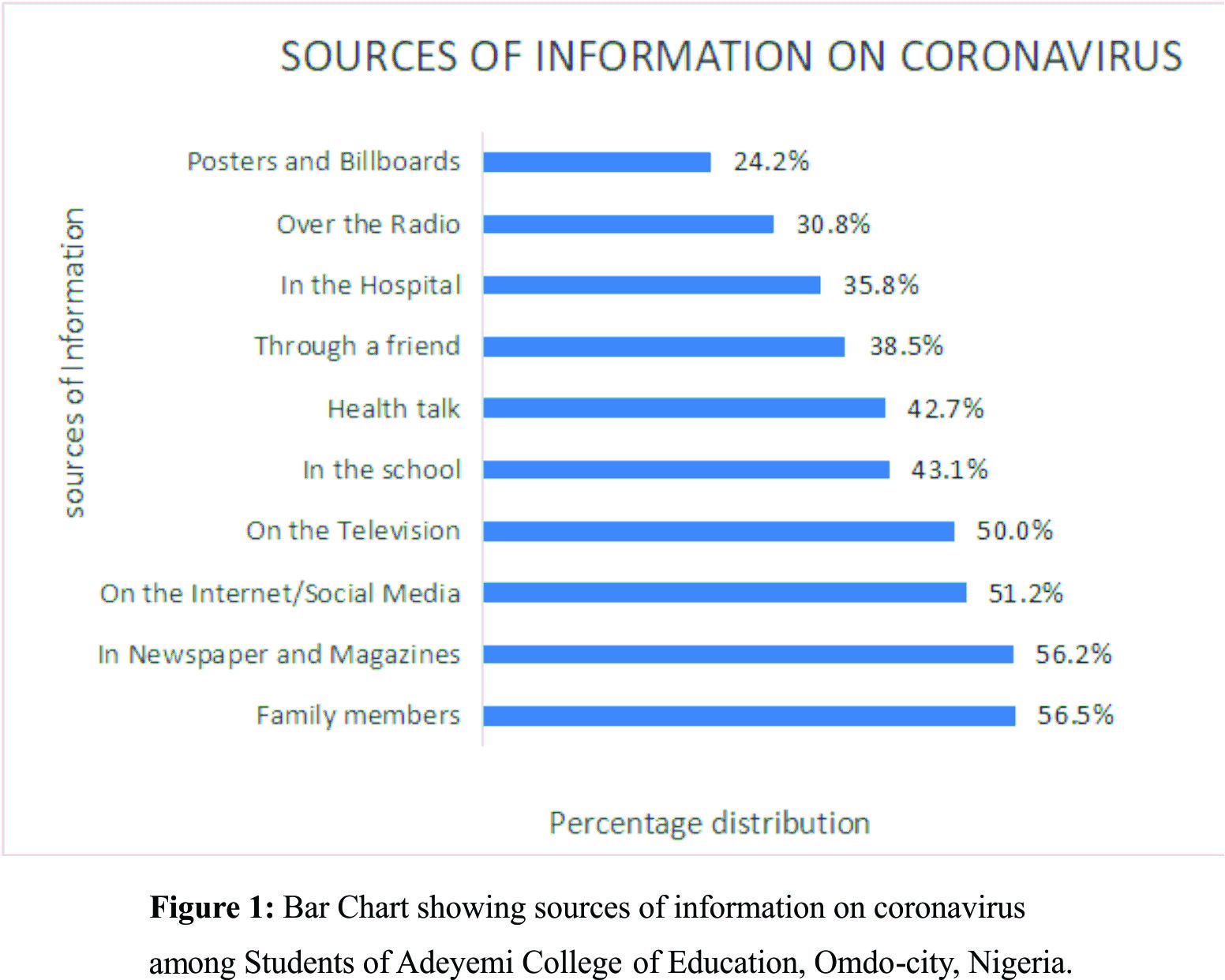Beliefs and Perceptions about COVID-19 among Students of a Higher Institution in South-western Nigeria
Main Article Content
Abstract
The on-going coronavirus disease outbreak is arguably one of the greatest public health challenges of our time. Being a novel disease discovered in December 2019, little is known about it. This study examines the beliefs and perception on coronavirus disease among students of an institution of higher learning in Southwest Nigeria. Two hundred and sixty (260) students were selected through a two-staged non-probability sampling method for the study. Data was collected using structured questionnaire which tested the general knowledge of respondents on the subject as well as their beliefs and perception about the disease. Even though 90.0%) of the participants have heard of Coronavirus as a pathogen, their knowledge of the associated disease was fair on the average due to misconceived notions probably because information was sourced majorly from unconfirmed sources such as word of mouth from family members (56.5%), print media (56.2%), social media (51.2%), television (50.0%), and to a lesser extent from school (43.1%), health talk (42.7%), hospital (35.8%), over the radio (30.8%) as well as posters and billboards (24.2%). These misconceived notions, despite their level of education, include but not limited to claims that disease can be transmitted through mosquito bite (33,5%) and believing that it is a consequence of man's sin (48.1%). Some doubt its existence (28.8%) while a sizeable number believes they cannot be infected (44.2%) and peradventure if infected, prayer and fasting can cure it (44.2%). We therefore advocates for an intense public enlightenment campaign.
Metrics
Article Details
References
World Health Organization. Naming the coronavirus disease (COVID-19) and the virus that causes it. 2020. Retrieved from https://www.who.int/emergencies/diseases/novel-coronavirus-2019/technical-guidance/naming-the-coronavirus-disease-(covid-2019)-and-the-virus-that-causes-it.
Hui, D.S., Azhar, E.I., Madani, T.A., Ntoumi, F., Kock, R., Dar, O., et al. The continuing 2019-nCoV epidemic threat of novel coronaviruses to global health - The latest 2019 novel coronavirus outbreak in Wuhan, China. Int J Infect Dis. 2020;91:264‐266 DOI: https://doi.org/10.1016/j.ijid.2020.01.009
WHO. WHO Director-General's opening remarks at the media briefing on COVID-19. (Press release). 11 March 2020. Retrieved from: https://www.who.int/dg/speeches/detail/who-director-general-s-opening-remarks-at-the-media-briefing-on-covid-19---11-march-2020.
Centre for Disease Control and Prevention. Symptoms of Novel Coronavirus (2019-nCoV).Retrieved 11 February 2020. Retrieved from: https://web.archive.org/web/20200130202038/https://www.cdc.gov/coronavirus/2019-ncov/about/symptoms.html.
CDC. Coronavirus Disease 2019 (COVID-19) Symptoms. 30 January 2020. Retrieved from: https://web.archive.org/web/20200130202038/https://www.cdc.gov/coronavirus/2019-ncov/about/symptoms.html.
WHO. Q&A on coronaviruses (COVID-19). 11 March 2020. Retrieved from: https://www.who.int/news-room/q-a-detail/q-a-coronaviruses.
Hopkins, C. Loss of sense of smell as marker of COVID-19 infection. Ear, Nose and Throat surgery body of United Kingdom. 28 March 2020. Retrieved from:https://www.entuk.org/sites/default/files/files/Loss%20of%20sense%20of%20smell%20as%20marker%20of%20COVID.pdf.
WHO. Q&A on coronaviruses. 20 January 2020. Retrieved from: https://www.who.int/news-room/q-a-detail/q-a-coronaviruses.
WHO. Q&A on coronaviruses. 11 February 2020. Retrieved from: https://www.who.int/news-room/q-a-detail/q-a-coronaviruses.
CDC. Coronavirus Disease 2019 (COVID-19) – Transmission 2020. Retrieved from:https://www.cdc.gov/coronavirus/2019-ncov/prevent-getting-sick/how-covid-spreads.html?CDC_AA_refVal=https%3A%2F%2Fwww.cdc.gov%2Fcoronavirus%2F2019-ncov%2Fprepare%2Ftransmission.html.
National Institutes of Health. .New coronavirus stable for hours on surfaces. 2020. Retrieved from: https://www.nih.gov/news-events/news-releases/new-coronavirus-stable-hours-surfaces.
Velavan, T. and Meyer, C., 2020. The COVID‐19 epidemic. Tropical Medicine & International Health, 25(3), 278-280. DOI: https://doi.org/10.1111/tmi.13383
WHO. Advice for Public. 26 January 2020. Retrieved from:https://www.who.int/emergencies/diseases/novel-coronavirus-2019/advice-for-public.
GOV.UK.. Guidance on social distancing for everyone in the UK. Retrieved from: https://www.gov.uk/government/publications/covid-19-guidance-on-social-distancing-and-for-vulnerable-people/guidance-on-social-distancing-for-everyone-in-the-uk-and-protecting-older-people-and-vulnerable-adults.
CDC. Coronavirus Disease 2019 (COVID-19). 15 February 2020. Retrieved from: https://www.cdc.gov/coronavirus/2019-ncov/prevent-getting-sick/prevention.html?CDC_AA_refVal=https%3A%2F%2Fwww.cdc.gov%2Fcoronavirus%2F2019-ncov%2Fprepare%2Fprevention.html.
WHO. Statement on the second meeting of the International Health Regulations (2005) Emergency Committee regarding the outbreak of novel coronavirus (2019-nCoV). 31 January 2020. Retrieved from: https://www.who.int/news-room/detail/30-01-2020-statement-on-the-second-meeting-of-the-international-health-regulations-(2005)-emergency-committee-regarding-the-outbreak-of-novel-coronavirus-(2019-ncov).
Mahtani, S., Berger, M., O'Grady, S., Iati, M. Hundreds of evacuees to be held on bases in California; Hong Kong and Taiwan restrict travel from mainland China. The Washington Post. 2020; Retrieved from: https://www.washingtonpost.com/world/asia_pacific/coronavirus-china-live-updates/2020/02/05/114ced8a-479c-11ea-bc78-8a18f7afcee7_story.html.
Worldometer. Coronavirus Cases. (2020, March 30). Retrieved from: https://www.worldometers.info/coronavirus/.
BBC News. Coronavirus: Nigeria confirms first case in sub-Saharan Africa. 2020, March 28. Retrieved from: https://www.bbc.com/news/world-africa-51671834.
Adejumo, K. Coronavirus: University of Ibadan predicts 312 cases in Nigeria by Friday. 2020, March 30. Retrieved from: https://www.premiumtimesng.com/coronavirus/384843-coronavirus-university-of-ibadan-predicts-312-cases-in-nigeria-by-friday.html.
John Zarocostas. How to fight an infodemic. Lancet.2020; 395(10225): 676 https://www.thelancet.com/journals/lancet/article/PIIS0140-6736(20)30461-X/fulltext DOI: https://doi.org/10.1016/S0140-6736(20)30461-X
Tedros, A.G.WHO speeches. Munich Security Conference. 2020. Available at https://www.who.int/dg/speeches/detail/munich-security-conference. Accessed on 25/05/2020
Rasmus K.N., Richard F., Nic Newman, Scott B., and Philip N.H. Navigating the 'Infodemic': How People in Six Countries Access and Rate News and Information about Coronavirus. Reuters Institute for the Study of Journalism. Available at https://g8fip1kplyr33r3krz5b97d1-wpengine.netdna-ssl.com/wp-content/uploads/2020/04/Navigating-the-Coronavirus-infodemic.pdf. Accessed on 25/05/2020
Feinstein L, Sabates R, Anderson T, Sorhaindo A, Hammond C. What are the effects of education on health? In: Desjardins R, Schuller T, editors. Measuring the effects of education on health and civic engagement (Internet). Copenhagen: Organisation for Economic Co-operation and Development. 2006 Retrieved from http://www.oecd.org/document/61/0,3343,en_2649_35845581_37425853_1_1_1_1,00.html
Oman, D. & Thorensen, C.E. Does Religion Cause Health?: Differing Interpretation and Diverse Meanings. Journal of Health Psychology.2002; 7: 365-380. DOI: https://doi.org/10.1177/1359105302007004326
Glik, D. C. Risk Communication for Public Health Emergencies. Annual Review of Public Health.2007; 28(1), 33–54. Available at https://doi.org/10.1146/annurev.publhealth.28.021406.144123 DOI: https://doi.org/10.1146/annurev.publhealth.28.021406.144123
McDaniel S.H., Campbell T.L., Seaburn D.B. How Families Affect Illness. In: Family-Oriented Primary Care. Springer, New York, NY.1990; PP16-32. DOI: https://doi.org/10.1007/978-1-4757-2096-9_2
Centers for Disease Control. COVID 19.Taiwan. Retrieved from: https://www.cdc.gov.tw/En/Category/QAPage/LnqBFJsulw6fW3nswc04Yw.

